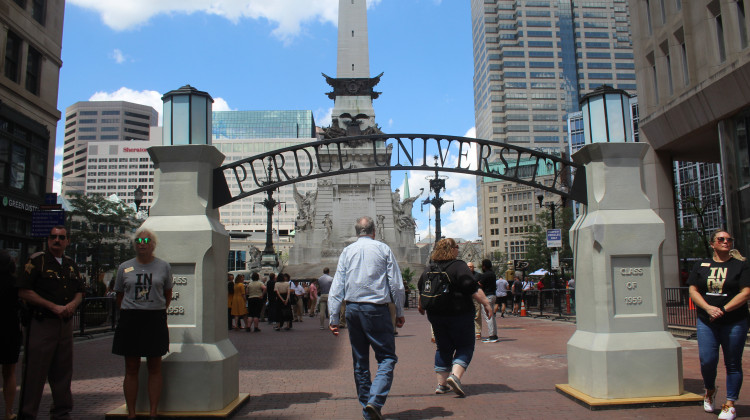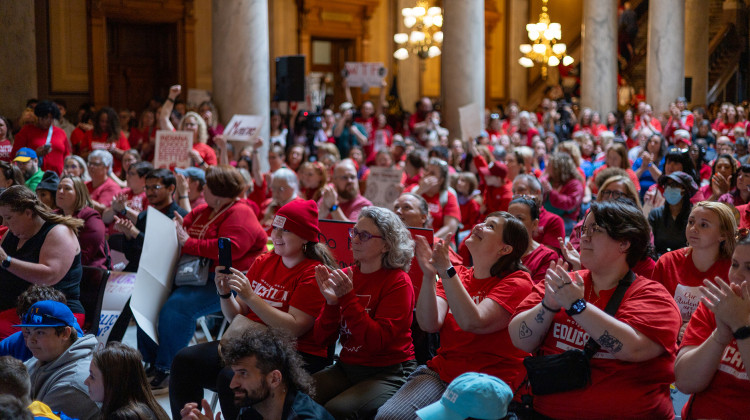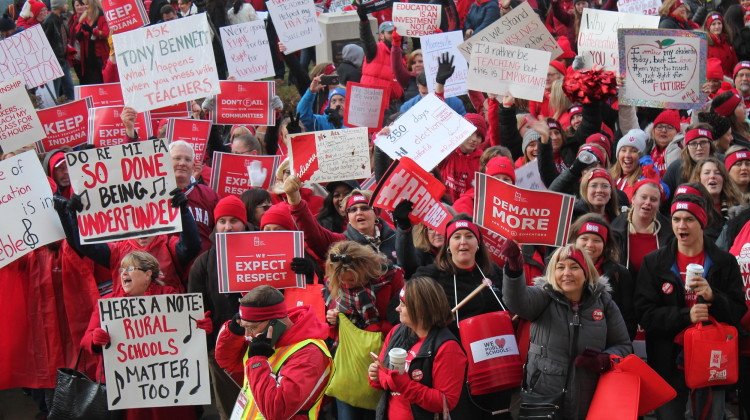
One section of the law requires the state’s Commission on Seclusion and Restraint — which was initially established by a law passed over a decade ago — to meet twice per year rather than just once.
File Photo: WFYIGov. Eric Holcomb signed a new law that bars Indiana schools from temporarily removing a student from instruction — known as “time-out” — except as a last resort and in situations where safety is at risk.
The new law also requires the state’s Commission on Seclusion and Restraint — which was initially established by a law passed over a decade ago — to meet twice per year rather than just once.
The initial legislation was authored by Rep. Becky Cash (R-Zionsville) in response to a WFYI investigation that found that some schools weren’t accurately reporting how often they restrain and forcibly isolate students.
The reporting also uncovered years-long lack of oversight at the state level that prevented officials from knowing whether schools are using these interventions as intended under Indiana law.
Cash, who is a parent of several children with disabilities, said the legislation was also inspired by an incident in Brownsburg schools in which a 7-year-old student with a disability was told by staff to eat his own vomit. Cash’s district includes a portion of Brownsburg.
Cash said she’s aware of schools that use the same rooms for time-out that they do to seclude students.
“Except that technically, the child can open the door, even if they don't know they can open the door, even if they're afraid to open the door,” she said.
The U.S. Department of Education’s Office for Civil Rights defines time-out as a behavior management technique that includes the monitored separation of a student into a non-locked setting for the purpose of calming the student.
Seclusion is the forced confinement of a student alone in a room or area where they cannot leave.
Cash said this new law is significant because it will force schools to report time-out incidents — in addition to restraints and seclusions — to parents.
“I do not believe that we need to be putting children in closets and broom closets, in any school for any reason in the state of Indiana,” Cash said.
What the new law requires
House Enrolled Act 1380 defines “time-out” as a “behavior reduction procedure in which access to reinforcement is withdrawn for a certain period of time.” It does not include supervised breaks that may be part of some students’ with disabilities’ individualized education programs.
The law requires school employees to document each time-out incident and notify parents or guardians when a student is subjected to time-out. Indiana schools are currently required to report seclusion and restraint to parents, but time-outs have not previously been regulated in this manner.
But the law does not require schools to report time-out incidents to the Indiana Department of Education, according to Molly Williams, a spokesperson for the department.
Indiana schools are required to report seclusion and restraint incidents to the IDOE. But WFYI’s investigation and a backlog of audits conducted by the IDOE after the investigation was published show some schools do not accurately report how often they forcibly isolate and restrain students.
Database: Students secluded and restrained in Indiana schools
Kim Dodson, a member of the Commission on Seclusion and Restraint and CEO of the Arc of Indiana, wants the commission to focus on helping schools minimize the use of time-outs. She also said she hopes they can find a way to require that those incidents are also reported to the IDOE.
“The reason why we're even having this conversation is because we heard from way too many families that time-outs were being used much like seclusion,” Dodson said.
Dodson is happy that the law requires the commission to meet more frequently. She said it will hopefully raise awareness of the issue and add “a little bit more scrutiny as well to make sure that things are taking place like they should be, and we’re not overusing, misusing, seclusion, restraint, time-outs.”
The new law would also require the Commission on Seclusion and Restraint to send incident reports and updates on their work to the state advisory council on the education of children with disabilities twice per year.
The initial legislation authored by Cash would have also required schools to install cameras in areas where children with severe disabilities are educated, and where students are placed in seclusion and time-out. But that bill died in the Senate after it received approval from the House.
Cash said she plans to revisit the camera legislation next year.
Contact WFYI education reporter Lee V. Gaines at lgaines@wfyi.org.
 DONATE
DONATE






 Support WFYI. We can't do it without you.
Support WFYI. We can't do it without you.